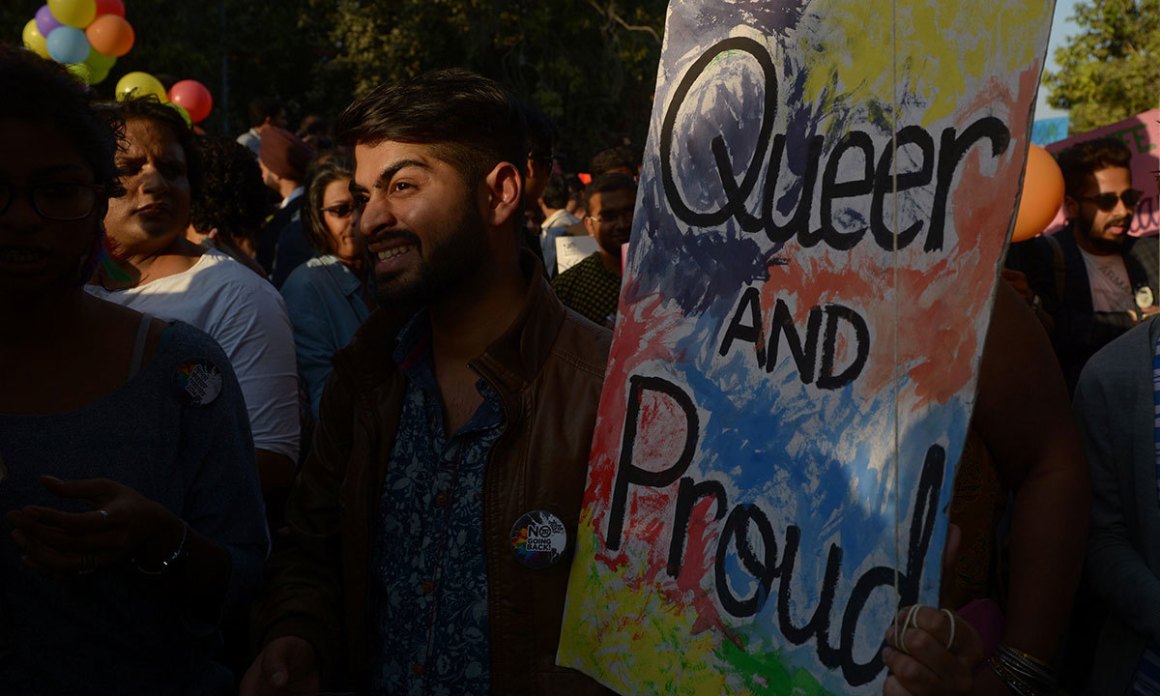

Participants in a pride parade in Delhi. Credit: Reuters
The latest Open For Business report, released in Davos earlier this week, reflects the diversity in engagement and the stark contrasts with which the Indian society loves, tolerates and hates the LGBTQ community. The report says several companies are backing the community “despite the country’s anti-LGBT+ laws”.
Most countries with regressive laws similar to Section 377 in India, and with a closed society, have seen the LGBT+ community at different levels of risk at their workplace – often substantial and high, or completely denied a job. Indian cities, such as New Delhi and Mumbai, are on a par with Bangkok and Manila when it comes to businesses that are open to the gay community. They fall in the “low” risk zone. This though would seem odd, considering the more open society and law in either of the two Southeast Asian cities. This is also in contrast with the laws in India and the generally conservative society that denies many of us spaces in and out of homes.
The coalition of global companies – Microsoft, Google, AT&T, IBM, LinkedIn to KPMG, Barclays, Goldman Sachs, Virgin and several others – making what ‘Open For Business’ is, met in India and interestingly, went beyond the aspect of economics. At its only meeting in Mumbai with the added presence of Godrej, Tata Sons, Intuit and BNY, the discussion was about Section 377 and how the society responds to the gay community or what happens to a gay man once he returns home from a ‘safe’ workspace to one that is probably hostile. This took the objective of the forum a bit beyond the economics of an individual or even how a safe space helps the bottomline or shareholder value.
According to the report, Nisaba Godrej, a director at Godrej, said in an email, “I would be proud if we create a culture where our LGBT colleagues can be comfortable being ‘out’ at work and every single one of us is inclusive and respectful of it.”
Tata Steel aims to have “25% of its Tata Steel workers from diverse groups by 2020. Of this, 5% will be from the LGBT+ community”. Harish Bhat, managing director and CEO of Tata Global Beverages is quoted saying, “The LGBT lifestyle… is a perfectly natural space that exists in our world.”
The report goes on to identify new leaders that are open to the community in the Asian region, with many of them being from India such as Mahindra & Mahindra, Lupin Laboratories, Dr Reddy’s, Wipro and Tech Mahindra.
In contrast, around 40% of the working gay community has claimed that they have been harassed at their workplace, clearly underlining how much more has to be done for the community to feel safe when at work. Considering that about 35% of one’s waking hours (working life period) is spent at work, it is hard to imagine the trauma that many of the community go through.
The report draws a connection between innovation – going beyond technology – and openness. “It concerns an atmosphere of tolerance, free expression and cosmopolitanism,” the report says. When assessed, India ranks extremely low with nations such as China, Mexico, Turkey and Poland. This is not to be mixed up with the GDP or the sheer size of an economy; it is about creations, free minds thinking of new things and purely all that an open space can create which, in fact, potentially, leads to the growth of society and an economy.
In the Indian context, as one sociologist pointed out, the nation’s rich history of invention, art, and even what is called jugaad, resided in a more open era of acceptance, much of which was lost during the British rule and later somewhat destroyed by the middle class. “We were rich then,” he points out.
Pallav Patankar of the Humsafar Trust, substantiating the fact that there is a brain drain due to an oppressive law, says, “A lot of software professionals left the country, and this isn’t good for the industry, and it isn’t good for the country”. In any case, why should any individual be denied the right to feel at home in his nation? Or be denied the right to work and a livelihood.
A large number of the LGBT+ community globally ‘conceals’ their identity – a phenomenon described as ‘covering’. It takes “considerable effort and creates stress” since “individuals divert attention from their core tasks, and waste energy worrying about discovery and its consequences.” This leads to low motivation and productivity. Kenji Yoshino for Deloitte University, the report says, “found that the pressure to cover is particularly strong for LGBT+ individuals” and that 83% of LGB individuals report covering.”
Human right activists would be skeptical of any initiative by a corporate towards an oppressed community. The angst of being seen as a cause or part of a social responsibility exercise linked with image and reputation has an established history that can hurt many in the community. It has hurt me in any case.
However, it is difficult to take away the reality of economics and living. It is impossible not to be real enough to realise that those around you at your workplace are part of society and hence may carry a baggage that lacks the awareness of being humane. Yet, the fact that HR policies in India are changing, and that leadership of certain corporations is driving that with new vision statements, is something that cannot be ignored.
Copy : https://thewire.in
Copyright © All right reserved to pahichan.com Site By: Sobij.